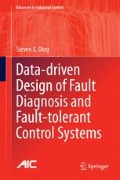Abstract
In the previous chapters, we have studied two standard MVA methods, PCA and PLS, and their applications to process monitoring and fault diagnosis. Canonical correlation analysis (CCA) is a further MVA method, which is also, in particular in the control community, known as canonical variate analysis (CVA) and recognized as a standard method for system identification.
Access this chapter
Tax calculation will be finalised at checkout
Purchases are for personal use only
References
Härdle WK, Simar L (2012) Applied multivariate statistical analysis, 3rd edn. Springer, Berlin Heidelberg
Larimore WE (1983) System identification reduced-order filtering and modeling via canonical variate analysis. In: Proceedings of the American control conference (ACC), pp 445–451
Katayama T (2005) Subspace methods for system identification. Springer-Verlag, London
Huang B, Kadali R (2008) Dynamic modelling, predictive control and performance monitoring, a data-driven subspace approach. Springer-Verlag, London
Russell EL, Chiang L, Braatz RD (2000) Data-driven techniques for fault detection and diagnosis in chemical processes. Springer-Verlag, London
Larimore W (1990) Canonical variate analysis in identification, filtering, and adaptive control. In: Proceedings of the 29th IEEE CDC, pp 596–604
Wang J, Qin SJ (2002) A new subspace identification approach based on principle component analysis. J Process Control 12:841–855
Russell EL, Chiang LH, Braatz RD (2000) Fault detection in industrial processes using canonical variate analysis and dynamic principal component analysis. Chemom Intell Lab Syst 51: 81–93
Simoglou A, Martin E, Morris A (2000) Multivariate statistical process control of an industrial fluidised-bed reactor. Control Eng Pract 8:893–909
Juricek BC, Seborg DE, Larimore WE (2004) Fault detection using canonical variate analysis. Ind Eng Chem Res 43:458–474
Odiowei P, Cao Y (2010) Nonlinear dynamic process monitoring using canonical variate analysis and kernel density estimations. IEEE Trans Ind Inform 6:36–45
Yin S, Ding SX, Haghani A, Hao H, Zhang P (2012) A comparison study of basic data-driven fault diagnosis and process monitoring methods on the benchmark tennessee eastman process. J Process Control 22:1567–1581
Author information
Authors and Affiliations
Corresponding author
Rights and permissions
Copyright information
© 2014 Springer-Verlag London
About this chapter
Cite this chapter
Ding, S.X. (2014). Canonical Variate Analysis Based Process Monitoring and Fault Diagnosis. In: Data-driven Design of Fault Diagnosis and Fault-tolerant Control Systems. Advances in Industrial Control. Springer, London. https://doi.org/10.1007/978-1-4471-6410-4_7
Download citation
DOI: https://doi.org/10.1007/978-1-4471-6410-4_7
Published:
Publisher Name: Springer, London
Print ISBN: 978-1-4471-6409-8
Online ISBN: 978-1-4471-6410-4
eBook Packages: EngineeringEngineering (R0)

